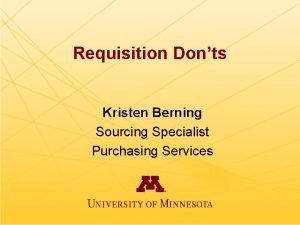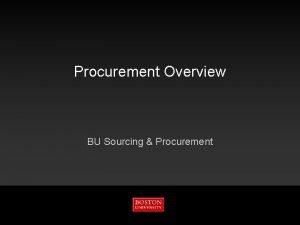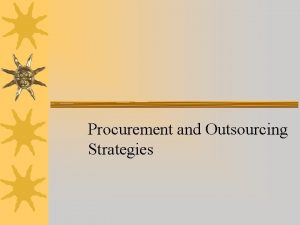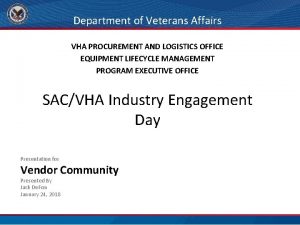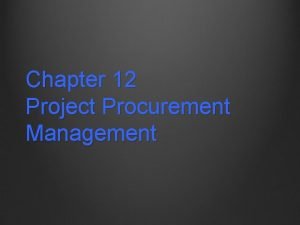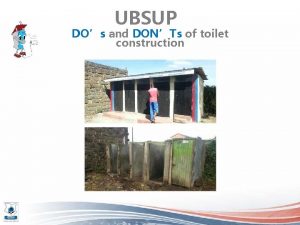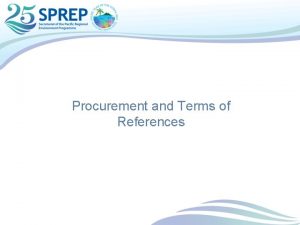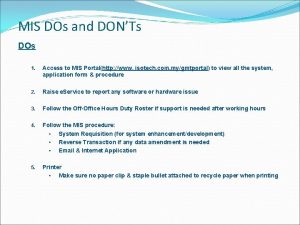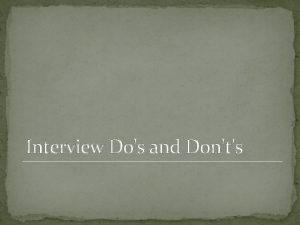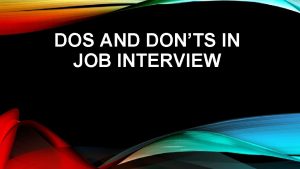Dos and Donts of Procurement 15 Dos of










- Slides: 10

Dos and Don’ts of Procurement

15 Dos of effective procurement 1. Provide adequate time in each step of roadmap in STEP. 2. The starting date in the roadmap given in STEP must be progressive by three week to one month at least. 3. Identify your activity and type of procurement process within the ambit of World Bank guidelines before entering into STEP. (For example Books/Journals must be through direct selection). 4. Since, more than 90% of the procurement activity pertains to RFQ category hence, collection of quotation should be on random basis, through limited market approach, from an authorized vendor and without any bias.

15 Dos of effective procurement 5. Only prescribed proforma given by World Bank for RFQ, NCB and ICB must be used to rule out any error in procurement. 6. Never award any contract on expired bid without extending the bid validity. 7. All the steps of roadmap given in STEP must be scrupulously entered with valid documents and never skip any step of roadmap given in STEP. 8. The entry/upload of each document in the step of roadmap must be simultaneous with the activity rather than accumulating them and entered in STEP once or twice.

15 Dos of effective procurement 9. After uploading the document of Notification of Award in STEP no further modification or deletion are allowed therefore, utmost care should be given before uploading any document of notification of award. 10. Before evaluation of bids under RFQ, NCB or ICB the bid evaluation criteria of evaluating each item wise or evaluation by combining all item together must be clearly indicated by ticking the relevant option of clause 6 of RFQ and similarly for NCB and ICB. So, that your evaluation process remains transparent and unquestionable. 11. Never mix-up one type of procurement with another e. g. from RFQ to Direct. This may lead to mis-procurement. AUs must adhere themselves with the type of procurement for which they got the approval, however, in case they want to change in mode of procurement, then a new activity must be created in lieu of old one with justification for further approval.

15 Dos of effective procurement 12. Only upload items which are part of sanctioned list of capital head under category of goods, works and consultancies of the respective AUs. 13. Use the same name/terminology as depicted in the sanctioned list. 14. Club similar activities in one procurement plan which can be procured from the single vendor. 15. When it is necessary to procure the goods/works through multiple sources, segregate the items into two or more procurement plans. For e. g. works may be segregated into civil, electrical, wood work, interior decoration etc.

15 Don’ts of effective procurement 1. Never start any activity of procurement without approval of World Bank in STEP. 2. Never split any contract of goods and works after uploading as a single activity in STEP. 3. Never Split a single procurement plan on the basis of geographical location. 4. Never club similar item of goods and works with different roadmap pertaining to different years. Different activity with different roadmap must be created to perform in different span of time.

15 Don’ts of effective procurement 5. Specifications should not be very rigid so that even minimum number of three vendors cannot be identified. 6. Never submit a procurement plan for direct purchase without proper justification and proprietary certificate. 7. Never skip uploading of document in roadmap of STEP and simultaneously tick mark the applicable box in clause 6 (“Individual/Collective evaluation”) of RFQ for the sake of transparency. 8. Never upload any goods/minor works to be done through operational cost in STEP.

15 Don’ts of effective procurement Never miss to take performance security in case of goods having warranty issues and works. 10. Never forget to mention the crucial dates of submission of quotes, opening dates of quotes, bid validity period, other contract obligations e. g. warranty and inbuilt AMC and most importantly the end date of supply/completion of work in the RFQ/NCB/ICB document. 11. Specification of goods should not indicate particular brand/model or make. The specification should not be restrictive. 12. Never reduce or increase the quantum of material or scope of work than as prescribed in RFQ/NCB/ICB while placement of order for goods and works. 9.

15 Don’ts of effective procurement 13. Never make any payment without fulfilment of all contract obligations like warranty, AMC and onsite delivery. At least proportionate collateral security by performance security etc. may be obtained before making any payment. 14. Never compromise on minimum three quotation from different sources of authorized vendor in case of RFQ. 15. Never upload any irrelevant document in different stages of roadmap of STEP. It will unnecessarily create doubt in the mind of PIU and World Bank.

Please follow all the world bank guidelines already provided to you and available on World Bank and NAHEP website Also ensure to complete the specified activity on or before the date as agreed during the procurement review. Thanks for your corporation.





